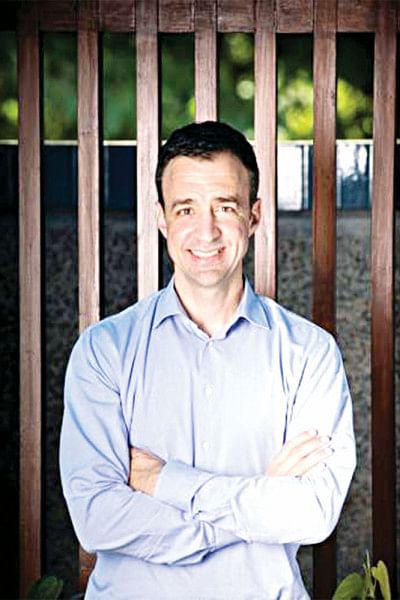Bridge the gap between learning and earning

I think the overarching feeling is that young people need skills that are relevant to the present and the future. The good news is that everybody is coalescing, and mobilising around young people, skills and jobs
Generation Unlimited (GenU) launched in Bangladesh in February 2019 is a public-private-youth sector-driven multi-stakeholder initiative and partnerships platform with an ambitious goal of enabling 17 million opportunities for youth with quality education and training, employment, youth entrepreneurship and youth engagement in the country by 2025. GenU CEO Dr Kevin Frey shares the journey so far and what lies ahead.
This is your first visit to Bangladesh and you have been speaking with stakeholders from the government, private and the development sector. What are your key takeaways from these meetings?
I've had a great few meetings with the government, private sectors, civil society partners and young people. I think the overarching feeling is that young people need skills that are relevant to the present and the future. The good news is that everybody is coalescing, and mobilising around young people, skills and jobs.
How did GenU come about? What were the challenges that you faced globally during the formation of GenU?
GenU is the largest cohort of young people that the world has seen. GenU is focused on young people. The 15-24 age bracket is our focus. It's important to ensure that youngsters are transitioning successfully from learning to earning.
GenU aims to address the struggle that people face with the changing nature of work by providing the youth with the necessary skills to prepare them for the future. GenU will work with multilateral institutions, governments and the private sector to achieve this.
And finally, GenU was set up to engage the youth in the process. The youngsters create the solutions they need, but usually don't have access to the network, power or funding. So, we created the world's first Public-Private-Youth Partnership (PPYP), where the youth are the centre of everything we do.
What are you working on right now in Bangladesh? What are the most pertinent issues?
Many issues need to be dealt with. Recently, we announced an exciting new initiative with the prime minister of England regarding girls' education and skills. Bangladesh and Nigeria are the two focused countries for this initiative. The programme has two aspects. The first is a learning platform called Passport to Learning, supported by Microsoft. The platform will provide digital skill training to youngsters along with certifications. The other half is a challenge fund that any organisation can apply to solve this skills gap and unemployment problem. The programme is supported by FCDO, the UK government's international development office.
Are there any other initiatives?
We recently launched a Career Hub in 10 locations across the country with UNICEF and BRAC. This initiative is supported by Generation Unlimited and UNICEF. There were nearly a thousand youngsters who attended the programme.
We have a great programme called Imagine Ventures, which is a news-led social innovation. This is for youngsters who are creating new ventures to contribute to SDGs. It is in Bangladesh and 42 other countries.
What would you say were the hurdles that you have faced since operating in Bangladesh?
One of the biggest obstacles is accessibility. Youngsters in the last-mile communities, who are the farthest behind and most vulnerable, can be hard to reach.
I visited a tea garden in Sylhet recently and I remember the quote, "99 out of 100 families do not have a smartphone at this tea garden". So, people don't have access to the devices they need and that's a huge issue for the country going forward.
At the career hub launch, we talked a lot about matching: are young people with skills being matched with jobs? Again, technology can play a powerful role there.
There are some fundamental challenges. We had a meeting with the Grameenphone CEO and he reminded me that Bangladesh leapfrogged land connections. Now the entire country is slowly coming online via smartphones.
Adding to what you said, one good aspect of Bangladesh as a country is that people are very good at adapting. What's your take on this?
One of the big strengths here is the innovation culture -- the entrepreneurial essence of the country.
I talked to a lot of young students recently. In Sylhet, I visited eight or nine different classrooms. I asked youngsters if they want to work for a corporation or start a business. In one of the classes, 90% said they want to start a business or do freelancing. In other classes, it was an even split between corporate work and entrepreneurship. So, there is a real sense of entrepreneurial essence in Bangladesh. People are always finding ways to generate livelihood.
What are your expectations from the private sector? How can they help in the long term?
Corporations are aware that graduates don't have the skills they need. Corporations want work-ready cohorts of professionals - graduating with future-ready skills to drive businesses forward.
If you look at the demographic of Bangladesh, youth is the largest cohort. You also see companies wanting to give back and engage, partially because those young people will also become their customers.
What is the long-term impact that you see with this new initiative?
We are at the start of a journey. We were founded in 2018, got going in 2019, and then Covid-19 hit us. Our vision is that by 2030, we would like to reach 500 million youngsters with opportunities for skills and connections to employment, entrepreneurship and social impact opportunities.
We think we can achieve our goals by harnessing the power of technology.
Business and youth are our two core constituents. The most important message I would have for young people is: you need to build skills for future work; skills that connect to jobs.
We need the private sectors on the table actively to engage and push the education system to define what skills are necessary and how the curriculum needs to change.
Transcribed by Tanzid Samad Choudhury


 For all latest news, follow The Daily Star's Google News channel.
For all latest news, follow The Daily Star's Google News channel. 



Comments